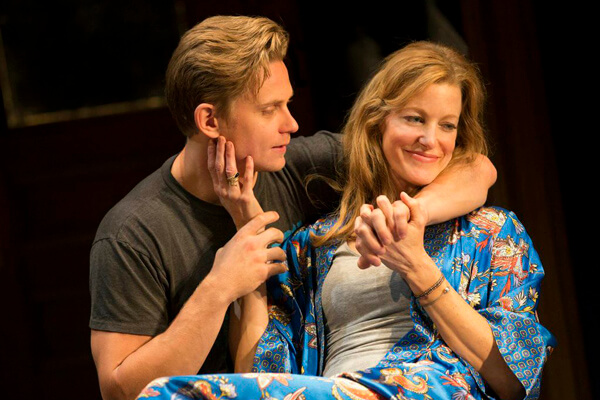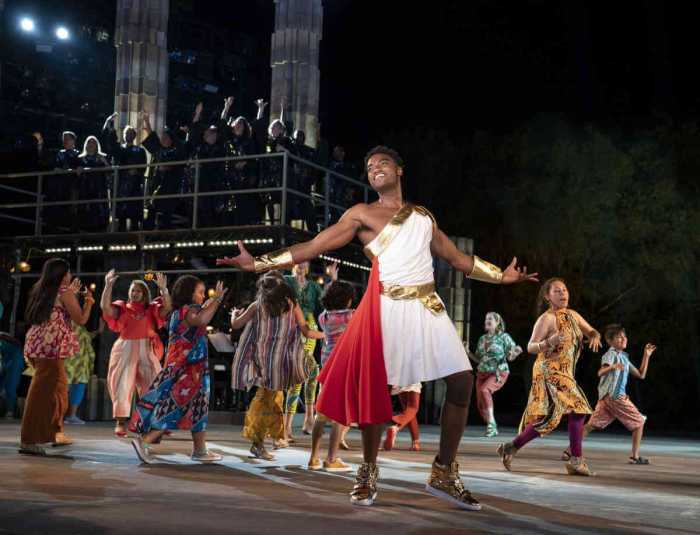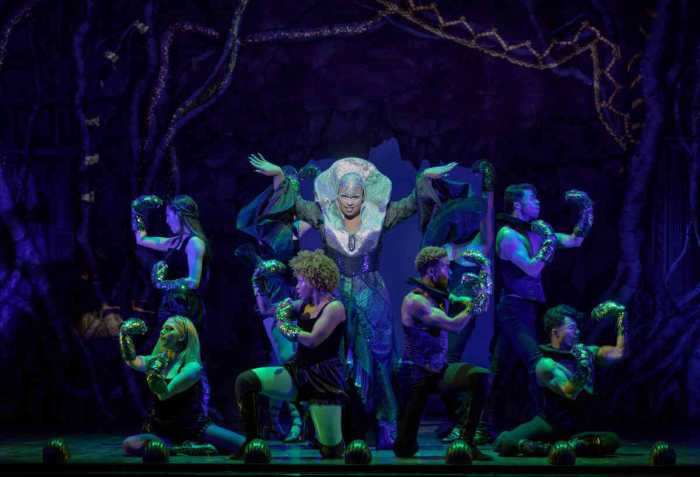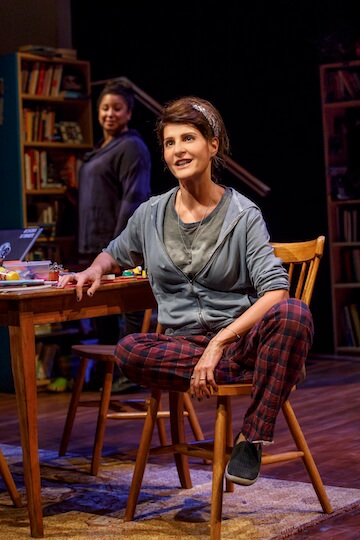Jay O. Sanders, Annette Bening, and John Lithgow in the Shakespeare in the Park production of “King Lear,” directed by Daniel Sullivan. | JOAN MARCUS
BY CHRISTOPHER BYRNE | Nature is so strong a theme in both the poetry and plot of “King Lear” that at first it’s surprising to walk into Central Park’s Delacorte Theater and see the bucolic surroundings virtually obscured by John Lee Beatty’s dominating, monochromatic wall. Mostly known for lavish interiors and finely wrought details, here Beatty takes a minimalist approach with sticks stuck in fabric. To the Elizabethans, though, nature often symbolized order at risk of being upset, so Beatty’s wall makes sense as a metaphor for man’s ongoing yet futile attempts to impose his own order on the world. It’s that sort of human failure that sets up the conflict and tragedy in “Lear.”
At the play’s opening, Lear sets about to keep peace in his kingdom by dividing it among his three daughters. His two eldest — Goneril and Regan — get their portions by flattering their father. When the youngest, Cordelia, refuses to play that game, she is banished and it is the nature of family and succession within the family that is the first casualty. The court, by its nature, involves political intrigue and, with Lear no longer in control, fighting soon overtakes all the characters. Unable to find a peaceful home with his elder daughters, he soon abandons himself to physical nature and, in a violent storm, he goes mad.
Several subplots, meanwhile, explore the nature of loyalty and family legitimacy. It is only when the conflict between good and evil have played themselves out that the balance of nature can be restored. As in any revenge tragedy worth its Sturm und Drang, that moment must await a massive pile-up of corpses.
Competition, power games in plays old and new
Lear is a star part, and in this production John Lithgow is extraordinary. Other actors playing Lear have consumed the stage and eclipsed everyone else on stage. In contrast, Lithgow shows remarkable restraint, conveying a rich inner life and very much inhabiting the world of the play, a reading that makes him one of the most affecting Lears I’ve seen. This Lear connects, or tries to, with the other characters. His interactions with his Fool and Kent, a banished nobleman who disguises himself to stay in Lear’s service, are powerful, making it easy to appreciate why they would follow him in his descent in the hopes of saving him.
Annette Bening gives a fine performance as Goneril. She’s every bit as regally evil and sexually predatory with the bastard Edmund as one could wish, but like Lithgow, she’s grounded and never cartoonish, which is always the risk with this part. Jessica Hecht as Regan seems afflicted with middle child syndrome — until she lashes out with violence that is unexpected and powerful.
Cordelia has the hardest part among the three daughters as she’s gone for much of the play and has to be consistently noble, but Jessica Collins meets the challenge well. Jay O. Saunders as Kent is perfectly matched with Lithgow and handles what slight comedy there is in the role with aplomb.
Understatement, as with Beatty’s set and the acting, is the key to this production’s success. Directed with great control and keen grasp of the text by Daniel Sullivan and with spectacular lighting by Jeff Croiter, video design by Tal Yarden, and Druidic costumes by Susan Hilferty, the play and the story have seldom seemed so clear or immediate.
With so many “King Lears” in recent seasons, it may be hard to muster the interest to go through it all again. This one is more than worth it. As Sullivan and his company tell the story simply and directly — while never shortchanging the epic nature and grand guignol inherent in the play — this is a definitive production of “King Lear” for our politically charged times–– as insightful as it is engrossing. This “Lear” is the very nature of outstanding theater.
Billy Magnussen and Anna Gunn in Laura Eason’s “Sex With Strangers,” directed by David Schwimmer. | JOAN MARCUS
For those who bemoan the disappearance of the “well-made-play,” feeling that too many new scripts are simply weak screenplays plopped on the stage, there is cause for celebration. Laura Eason’s “Sex With Strangers,” at Second Stage through September 1, is smart, brilliantly plotted, and completely entertaining.
Its beautifully intersecting themes touch on art, commerce, power, and how all of these can change people. Ethan has written a best-selling book based on his blog chronicling his year of –– you guessed it –– sex with strangers. Olivia has written a literary novel, which failed, and a new one, about which she is almost pathologically protective, paralyzed by the fear of another failure. Ethan wants to write like Olivia, and Olivia wants Ethan’s success. What happens between them is sexually charged, intellectually fascinating, and emotionally chaotic.
It’s not surprising that Ethan is deeper than the shallow person he has created for himself to pander to the market, and Olivia is far more ambitious and cutthroat than she would like to admit. What makes their story so engaging is Eason’s sharp writing and deep understanding of the characters. At times hilariously funny, particularly when Ethan’s unflinching confidence, youthful exuberance, and grasp of social media clash with Olivia’s reserved, cerebral approach to life, and very moving when the tables are turned, Eason’s tale offers us real people in believable situations. The interplay of sex and power and the ensuing complications are not new in literature, but the freshness of the storytelling and the precision of the construction make this play remarkable. Eason presents a trenchant examination of personal identity in a world where truth and fiction are often indistinguishable. Ethan embraces –– while Olivia struggles with –– a world in which art and the artist are inseparable, where commercial success often depends as much on the celebrity as on the work they create.
David Schwimmer has directed with a deft hand for both the comedy and the more melancholy moments, and there isn’t a false moment in the play or the performances. Anna Gunn is outstanding as Olivia. She beautifully inhabits the shy and somewhat broken woman whose sense of self and passion are awakened by the arrival of Ethan. Billy Magnussen is every bit her match as Ethan, capturing the confidence of easy success and the conflict he feels with the artist he would like to become. With characters who are alternately brutal and merciful with each other over the course of the play, Gunn and Magnussen negotiate these changing dynamics with seeming effortlessness, offering a master class in naturalistic acting in the process.
What is so surprising and exciting about this play is that while it might appear to be a light summer comedy, it’s really a literate, thought-provoking piece of social criticism that just happens to be irresistible fun.
KING LEAR | Delacorte Theater in Central Park; enter at 81st St. & Central Park W. | Through Aug. 17 | Tue.-Sun at 8 p.m. | Free; ticket info at publictheater.org or r 212-539-8500 | Three hrs., with intermission
SEX WITH STRANGERS | Second Stage, 305 W. 43rd St. | Through Sep. 1: Tue.-Thu. at 7 p.m.; Thu.-Sat. at 8 p.m.; Sat. at 2 p.m.; Sun. at 3 p.m. | $75 at 2st.com or 212-246-4422 | Two hrs., 20 mins., with intermission

































